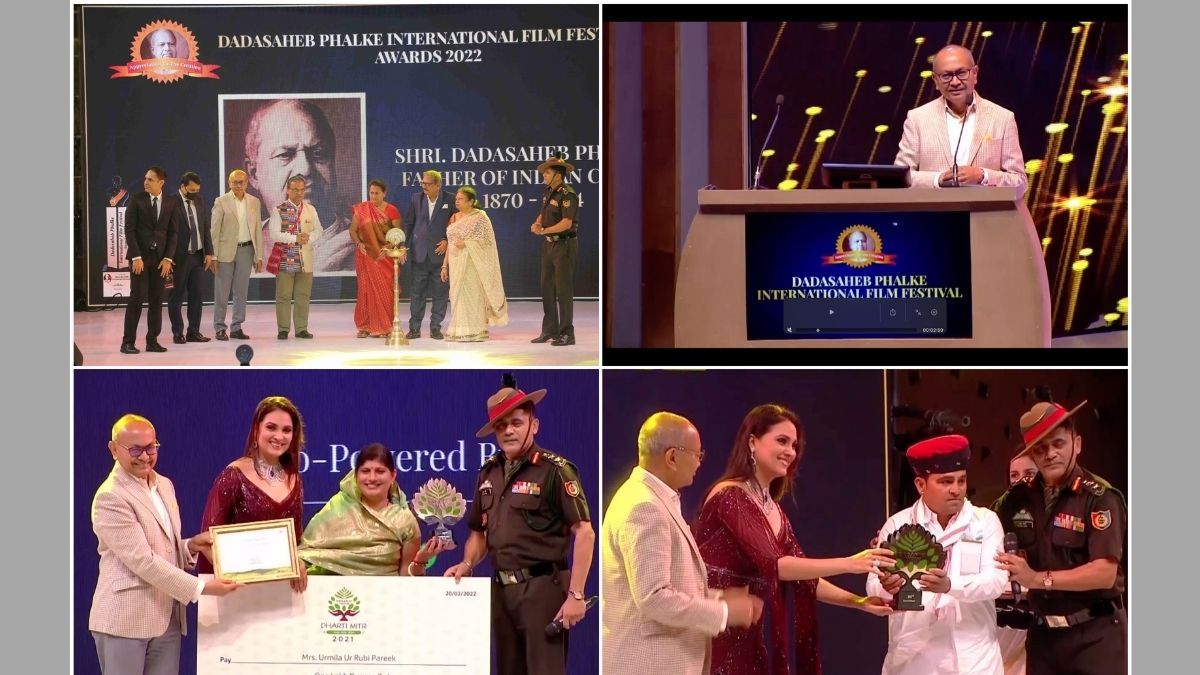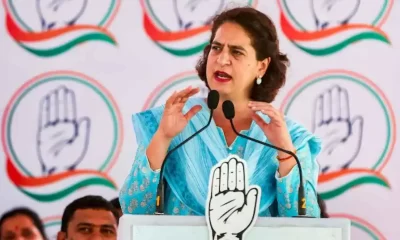Featured
Organic India felicitates the heroes of Indian agriculture with Dharti Mitr Award at the Dadasaheb Phalke International Film Festival 2022
Recognizing the contribution of farmers towards strengthening the entire ecosystem of organic farming, Organic India Private Limited (“Organic India”), in association with the prestigious Dadasaheb Phalke International Film Festival felicitated the top 5 organic farmers with Dharti Mitr Awards while celebrating the grandeur of Indian Cinema and commemorating 75 years of Independence (Azadi ka Amrit Mahotsav).

Recognizing the contribution of farmers towards strengthening the entire ecosystem of organic farming, Organic India Private Limited (“Organic India”), in association with the prestigious Dadasaheb Phalke International Film Festival felicitated the top 5 organic farmers with Dharti Mitr Awards while celebrating the grandeur of Indian Cinema and commemorating 75 years of Independence (Azadi ka Amrit Mahotsav).
The Dharti Mitr awards instituted by ORGANIC INDIA in the year 2017 to honor and recognize the efforts of organic farmers across the country, not just in growing crops without chemical inputs but also in balancing the ecosystem and creating innovative self-sustaining models. The Dharti Mitr awards also provides a platform for organic farmers across the country to share their innovation and cross populate their learnings. The winner of the first Dharti Mitr award 2017 Mr. Bharat Bhushan Tyagi, was bestowed with the Padma Shri, the fourth highest civilian award in India in 2019.
The winners of the Dharti Mitr awards 2021, felicitated by Bollywood actress Lara Dutta and Col. Tushar Joshi during the Dada Saheb Phalke International Film Festival, were Nathani Upendrbhai Dayabhai from Gujrat who won the first prize of INR. 5 Lakhs, Malleshappa Gulappa Bisirotti from Karnataka who won the second prize of INR. 3 Lakhs the third prize of INR. 1 Lakhs each went to Devaraddi Agasanakoppa fromKarnataka, Rawal Chand and Urmila Ur Rubi Pareek from Rajasthan.
Speaking at the event and expressing gratitude towards the relentless efforts made by the farmers, Subrata Dutta, Group Managing Director, Organic India said, “Our farmers play a very crucial role for the ecology, economy and the society, at large. We conceptualized the Dharti Mitr Awards to celebrate our relationship with individual farmers that is built on interconnectedness – an approach that seeks to boost their confidence and the core objective of the event is to highlight the farmer’s exceptional innovations in the field of organic farming.”
Speaking on the efforts of Organic India, William Nanda Bissell, Chairman, Fabindia, said,“Organic India instituted the Dharti Mitr Awards four years ago and this year, it has returned bigger and brighter in collaboration with the prestigious Dadasaheb Phalke International Film Festival (DPIFF). Organic farming plays an important role in the sustainable and environment-friendly growth of India. This appreciation and recognition by Organic India will strengthen the confidence of farmers and further build the organic farming ecosystem in India. Organic India is a very critical part of our efforts to establish new benchmarks for growth driven by ESG values.”
Organic India is currently working with over 2,200 farmers across the country to create favorable economic, environmental and social ecosystems, as well as to promote healthy lifestyles and conscious living via sustainable and regenerative organic agriculture. In the past years, Organic India has been rigorously working towards training the farmers and providing educational opportunities that enable self-sufficiency and the development of skills that can be passed on to future generations.
Also Read: The Great Indian Film Festival captivates audiences with short films from worldwide at Expo 2020
Expressing delight about the initiative, Dr. Ashok Yadav, Advisor, Ministry of Agriculture said, “The event has recognized the outstanding effort of organic farmers. We would like to congratulate all the participants and winners who are the unsung heroes of the agricultural landscape. Over the past 4 years of my association with Dharti Mitr, we have witnessed the participation and enthusiasm increasing and we are looking forward to witness more innovation in the segment which will add to the global organic farming movement to help the world in achieving the true meaning of sustainable development.”
Organic India received over 100+ nominations from farmers across the country, post which a rigorous screening process involving reviewing each entry followed by a farm visit and personal interview were undertaken by the jury.
About Organic India
ORGANIC INDIA is involved in the business of manufacturing, trading, exporting and importing all kinds of herbal infusions, ayurvedic medicines and preparations, herbs, herbal products, tea, food products and organic products. At the heart of ORGANIC INDIA is their commitment to being a living embodiment of love and Consciousness in action. Their products are made in India and reach consumers worldwide with a message of interconnectedness and oneness with Nature. https://www.organicindia.com/
Organic India is part of Fabindia Group, a consumer lifestyle platform with an established 62-year legacy focused on authentic, sustainable and Indian traditional lifestyle products. Fabindia is a unique business model of sustainable rural employment that has created a base for over 50,000 artisans through Contract Manufacturers and over 2,200 farmers engaged directly and 10,300 farmers engaged through associates in India. For more information, visit at www.fabindia.com
Featured
Nima Sulaiman joins HiLITE Group Board, her father gifts her a Porsche
Nima expressed her gratitude for the opportunity and her eagerness to contribute to the group’s success.

In a move signalling a generational shift in leadership and a commitment to empowering women in the business world, Nima Sulaiman, the daughter of HiLITE Group Chairman P. Sulaiman, has been welcomed onto the board of directors with a stunning gesture—a Porsche worth Rs 3 crore.
At just 18, Nima began her journey with HiLITE Group as a customer service trainee at Hug a Mug Cafe. From there, she transitioned to management roles, showcasing her talent and dedication. With a B.Sc in Economics from the University of London in Singapore, Nima brings a unique blend of academic prowess and practical experience to her new position.
As the Director of HiLITE Urban, a subsidiary of HiLITE Group, Nima is poised to continue the company’s legacy of excellence in construction and development. With a focus on providing quality living spaces and international standards in India, HiLITE Group has been instrumental in transforming Kozhikode city with its innovative projects that include premium residential buildings, ultra modern business parks, state-of-the-art malls and world-class entertainment theaters.
Group Chairman P. Sulaiman expressed his sentiments regarding his daughter’s recent appointment within the Group. He said, “I am immensely proud of Nima’s accomplishments and firmly believe that she is capable to take on greater responsiblities. HiLITE Group has always shed light on the significance of acknowledging and empowering women in leadership positions.” He further emphasised, “The emotional intelligence that women bring to the table is pivotal for fostering effective leadership and establishing trust.”
Nima, in turn, expressed her gratitude for the opportunity and her eagerness to contribute to the group’s success. “Inspired by my experiences visiting renowned malls worldwide, I strive to enrich the atmosphere of HiLITE malls and other projects, infusing them with vibrancy and youthfulness,” she said.
The appointment of Nima Sulaiman to the board of directors represents a significant milestone for HiLITE Group and a testament to the company’s commitment to innovation and inclusivity in the business world. As Nima takes on her new role, she stands as a beacon of inspiration for young women entrepreneurs in South India and beyond.
Featured
Steps to effective retirement planning
The importance of retirement planning depends on ensuring you have adequate funds to live comfortably after you stop earning a stable income.

Retirement planning is a critical aspect of financial stability that often goes overlooked until it’s too late. In India, where the culture of savings is ingrained yet formal retirement planning is still evolving, understanding, and initiating a retirement plan is more crucial than ever.
The importance of retirement planning depends on ensuring you have adequate funds to live comfortably after you stop earning a stable income. It is not only about saving a part of your earnings but also about investing in yourself. Here are some crucial reasons to begin retirement planning – combating inflation, securing financial freedom, managing medical expenditures, maintaining your living standard, supporting family requirements, meeting post-retirement goals, preparing for unanticipated circumstances, and leaving a legacy for dependents.
Here are ways to effectively plan your retirement –
Ø Utilise an online retirement calculator
An important instrument for planning, an online retirement calculator can assist you estimate how much you require to save to live a post-retirement life. It factors in your existing age, savings, retirement age, investments, and anticipated inflation rates.
Anjali is looking to retire at the age of 60 with a lifestyle that needs Rs 50,000 per month. Utilising an online retirement calculator, she considers her existing age of 30, anticipated inflation of 6 per cent and prevailing savings. The calculator estimates she needs a corpus of approximately Rs 2.5 crores to sustain her retirement life, helping her strategise her savings and investments accordingly.
Ø Start early
The sooner you start, the more you benefit from compound interest. Even starting small can lead to substantial growth over decades.
Imagine Rohit, who starts saving Rs 5,000 a month at age 25 in a mutual fund that averages an 8% annual return. By the time he turns 60, his investment would have grown to over Rs 1.50 crore, thanks to compound interest. In contrast, if Priya starts saving the same amount at 35 under the same conditions, she would accumulate about Rs 67 lakhs by age 60. The decade-long head start allows Rohit’s investments more time to compound, significantly impacting his retirement corpus.
Ø Create a retirement budget
Estimate your post-retirement expenses, considering inflation and changing lifestyle needs. Including fixed expenses, healthcare, leisure, and unexpected costs.
Vijay, nearing retirement, lists down his monthly expenses including groceries, utilities, healthcare, and leisure activities like travel and hobbies. Considering inflation, he predicts his current monthly expense of Rs 30,000 will rise to Rs 80,000 by the time he retires. This projection helps him understand how much he needs to save to maintain his lifestyle post-retirement.
Ø Opt for a pension plan
Investing in pension plans offered by insurance companies can guarantee a steady income post-retirement. They also provide tax benefits under Section 80C.
Raj invests in a pension plan that promises a monthly income of Rs 20,000 after retirement. This plan not only secures his future financially but also offers tax benefits today, making it a win-win investment for his retirement years.
Ø Diversify your investment portfolio
Do not put all your eggs in one basket. Invest in a mix of asset classes including equity, debt, mutual funds, and real estate. Consider your risk appetite and investment horizon.
Meena, an investor, allocates her savings across different asset classes—40 per cent in equity for growth, 30 per cent in bonds for stability, 20 per cent in mutual funds for diversified exposure, and 10 per cent in real estate for passive income. This diversification helps balance her risk and provides multiple growth avenues, ensuring her portfolio is well-equipped to handle market volatility.
Ø Maximise your EPF and PPF contributions
The EPF or employee provident fund and PPF or public provident fund are excellent tax-saving instruments that offer secure, high-interest earnings for retirement.
Sunita contributes the maximum allowable limit to her EPF and PPF accounts every year. These contributions not only reduce her taxable income but also accumulate tax-free earnings, creating a significant retirement fund that’s secure and government-backed.
Ø Maintain an emergency fund
Ensure you have an emergency fund worth at least 6-12 months of living expenses. This fund should be easily accessible and kept separate from your retirement savings.
Deepika saves six months’ worth of expenses in a liquid fund, separate from her investments and retirement savings. This fund acts as a financial cushion during unexpected events, such as medical emergencies or sudden unemployment, ensuring her long-term plans remain undisturbed.
Ø Invest in NPS or national pension scheme
The NPS is a government-backed retirement planning instrument that is market-linked and offers various fund options based on your risk tolerance.
Karan opts for the NPS, choosing a mix of equity, corporate bonds, and government securities, aligning with his moderate risk appetite. This allows his retirement savings to grow with the market while offering the flexibility to adjust the asset allocation as he gets closer to retirement.
Ø Educate yourself financially
Stay informed about financial planning, investment options, tax laws, and market trends. Knowledge is power, especially when it comes to managing your money.
Neha spends her time reading blogs linked with finance, attending workshops, and consulting with financial professionals. This constant learning equips her with considerable knowledge to make better decisions about her tax planning, investments, and retirement plan, ensuring she enhances her financial potential.
Ø Assess as well as adjust your plan periodically
Your retirement plan should adapt to your changing life circumstances. Annually, review your assets, savings, and goals and make any necessary modifications.
Every year, Amit updates his retirement plan to reflect changes in his income, spending, and life goals. This regular review keeps him on pace with his retirement objectives, allowing him to make necessary modifications to his savings rate and investment selections.
Final thoughts
Retirement planning is more than a financial responsibility; it is a commitment to your future self. Beginning today not just secures your financial future, but even endows you with mental peace and the opportunity to spend your retirement years as you see fit. Attaining a comfortable retirement involves vision, a proactive attitude, and discipline. Note that it is never too early or very late, to begin with retirement planning. The steps you take now can result in a better and more secure tomorrow.
Featured
Supreme Court AOR firm Vedic Legal settles the debate: Can ancestral property be sold without the consent of successors?

New Delhi (India), June 24: Ancestral property is a valuable asset that is passed
down from one generation to another. It is a symbol of family heritage and pride
that holds significant sentimental value for many families. However, the question
that has been long debated is whether ancestral property can be sold without the
consent of all successors.
According to Indian law, ancestral property is considered to be the collective
property of all successors of the original owner. As a result, the sale of ancestral
property without the consent of all successors is generally not allowed. The
reasoning behind this is that ancestral property is seen as a collective asset, and
all successors have an equal right to it.
However, in certain cases, the sale of ancestral property without the consent of all
successors may be allowed by law. For instance, in cases where the owner of the
property has died intestate and there is no will or agreement in place, legal heirs
may be able to sell off the ancestral property without seeking consent from all
other successors.
It is important to note that the rules regarding the sale of ancestral property
without consent may vary from state to state. Therefore, it is essential to consult a
lawyer before making any decision regarding the sale of ancestral property.
Supreme Court Advocate on record firm with Vedic Legal, a renowned law firm
specializing in property and succession law, recently settled a landmark case in
the Supreme Court. The case involved the sale of ancestral property without the
consent of all successors, and Supreme Court AOR firm Vedic Legal argued that
such a sale was not permissible under Indian law.
The verdict of the Supreme Court, based on Supreme Court AOR firm Vedic Legal
arguments, confirmed that ancestral property could not be sold without the
consent of all successors. This ruling has set a precedent for future cases and has
provided clarity on a contentious issue that has long been debated.
The complexity of the issue of selling ancestral property without the consent of
successors is not lost on legal experts. It is crucial to consider the legal and
ethical implications of such a sale, as it can have significant consequences for all
parties involved.
In some cases, however, selling the ancestral property without the consent of all
successors may be the best option. For example, in cases where there are
disputes between heirs or when some heirs are not reachable, selling ancestral
property without the consent of all successors may be allowed by law.
Additionally, in certain circumstances, selling the ancestral property without
consent may be the only way to resolve financial difficulties faced by the owners of
the property. This may include situations where the owners require funds for
medical treatment or other urgent needs.
However, any decision to sell the ancestral property without the consent of all
successors should be made after careful consideration and consultation with legal
experts. It is essential to ensure that all legal requirements are met and that the
rights of all parties involved are protected.
The sale of ancestral property without consent is a complex issue that requires
careful consideration and legal guidance. While it may be possible in some cases,
it is generally accepted that ancestral property is a collective asset that cannot be
sold without the consent of all successors.
The recent landmark case settled by Supreme Court AOR firm Vedic Legal in the
Supreme Court has provided clarity on the legal aspect of selling ancestral
property without the consent of successors. It has set a precedent for future cases
and has highlighted the importance of seeking legal guidance before making any
decision regarding the sale of ancestral property.
-

 Cricket news23 hours ago
Cricket news23 hours agoIPL 2024: Kolkata Knight Riders beat Mumbai Indians by 24 runs
-

 2024 Lok Sabha Elections19 hours ago
2024 Lok Sabha Elections19 hours agoPriyanka Gandhi calls PM Modi a shahenshah who lives in castles and can never understand the plight of the common man
-

 2024 Lok Sabha Elections18 hours ago
2024 Lok Sabha Elections18 hours agoFormer Delhi Congress chief Arvinder Singh Lovely joins BJP
-

 India News21 hours ago
India News21 hours agoRahul Gandhi writes to Karnataka CM over Prajwal Revanna sex scandal, urges him to provide utmost assistance to the victims
-

 Entertainment17 hours ago
Entertainment17 hours agoAunt Marge Dursley replica from Harry Potter floated in front of London’s Tower Bridge, video goes viral
-

 2024 Lok Sabha Elections22 hours ago
2024 Lok Sabha Elections22 hours agoPM Modi raises national security pitch to attack Congress, says Pakistan now weeping and screaming for help under BJP rule
-

 Trending15 hours ago
Trending15 hours agoViolent clash takes place at Karachi dhaba, video goes viral




